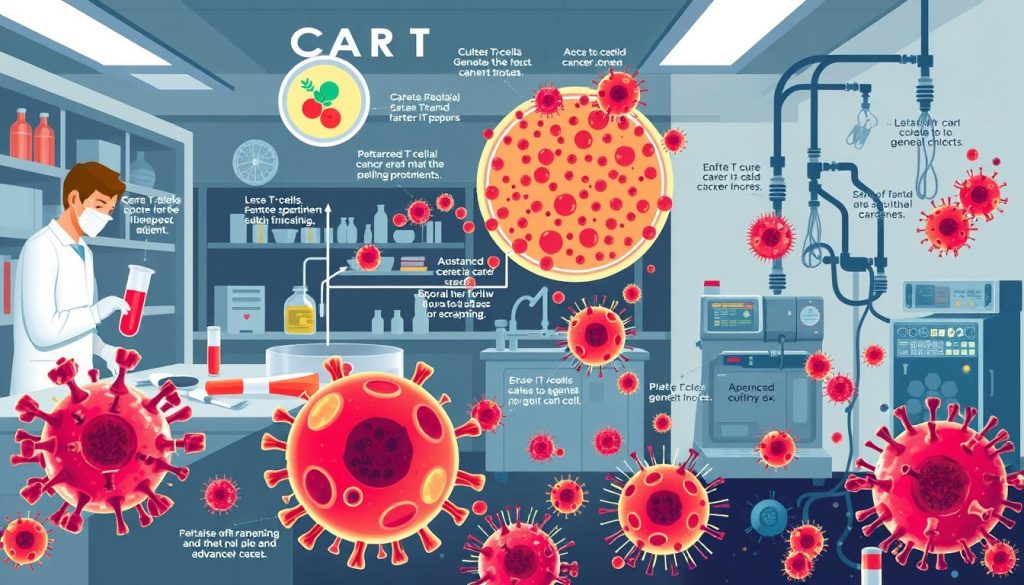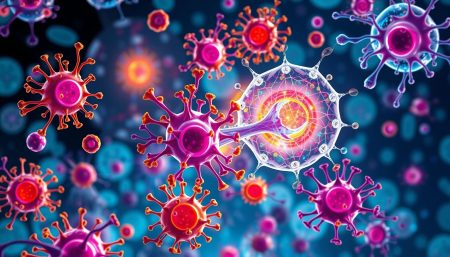The journey through cancer treatment is filled with hope and challenges. It also brings the promise of new medical discoveries. For those looking into CAR T cell therapy, knowing how long it takes is key. This guide aims to light the way, explaining the usual CAR T cell treatment timeline. It also answers a big question: how long does CAR T cell therapy take?
Key Takeaways
- Exploring the average duration of CAR T cell therapy from start to finish.
- Understanding the various stages and procedures involved in this innovative treatment.
- Setting realistic expectations for the CAR T cell treatment timeline.
- Preparing for the commitment required for CAR T cell therapy duration.
- Defining what factors can influence how long does CAR T cell therapy take.
Understanding CAR T Cell Therapy
CAR T cell therapy is a new way to fight cancer. It uses the body’s immune system to attack cancer cells. This method involves changing a patient’s T cells to make them better at finding and killing cancer.
Knowing how CAR T cell therapy process and CAR T cell treatment procedure work is key. It helps us understand why it’s so promising for cancer treatment.
What is CAR T Cell Therapy?
CAR T cell therapy is a form of immunotherapy. It changes a patient’s T cells to make them better at finding and killing cancer cells. It targets specific proteins on cancer cells, making treatment more personal.
This method is especially hopeful for those who haven’t responded to other treatments.
How Does CAR T Cell Therapy Work?
The CAR T cell treatment procedure starts with taking T cells from the patient’s blood. These cells are then changed in a lab to better fight cancer.
After they’re changed, the cells are put back into the patient’s body. There, they grow and start attacking the cancer. This approach is a big step forward in cancer treatment, aiming for targeted and effective results.
The Process of CAR T Cell Therapy
The journey through CAR T cell therapy is complex, with many steps from the first meeting to when the cells are put back in. This detailed process uses advanced CAR T cell therapy to strengthen a patient’s immune system against cancer.
Initial Consultation and Evaluation
The first step is a detailed check to see if the patient is right for CAR T cell therapy. Doctors look at the patient’s medical history, current health, and cancer type. This ensures the treatment is safe and effective.
T Cell Collection Procedure
Next, the patient has a procedure called leukapheresis to collect white blood cells. This is key because these cells are used to make T cells in the lab. These T cells will then target cancer cells.
Cell Modification Time
The collected T cells are then taken to a lab for genetic modification. They are made to have chimeric antigen receptors (CARs) on their surface. This change helps the T cells recognize and destroy cancer cells better.
Reinfusion of T Cells
The last step is when the modified T cells are put back into the patient’s blood. After this, the patient is watched closely for any side effects and to see how well the treatment is working.
This detailed CAR T cell therapy protocol is a groundbreaking way to fight cancer. It offers new hope and treatment options for those fighting this disease.
Duration of Each Phase in CAR T Cell Therapy
CAR T cell therapy has shown great promise in fighting cancer. Each stage of this therapy is crucial and has its own timeline. It’s important for both patients and doctors to know these details.
Timeframe for Assessment
The first step is a thorough check-up of the patient’s health and cancer type. This phase can take several weeks. Doctors run many tests to see if CAR T cell therapy is right for the patient.
Duration of T Cell Collection
After deciding on therapy, collecting T cells starts. This process takes a few hours in one session. But, getting ready and recovering can add a whole day to the process.
Length of Laboratory Processing
After collecting T cells, they are modified in a lab to fight cancer better. This step takes about two to three weeks. It’s done to make sure the CAR T cells can target cancer cells well when they’re put back into the patient.
| Phase | Expected Duration |
|---|---|
| Initial Assessment | 1-3 weeks |
| T Cell Collection | 1 day |
| Laboratory Processing | 2-3 weeks |
Factors Influencing Treatment Duration
When looking at the timeframe for CAR T cell therapy, many factors come into play. These factors can greatly affect how long the treatment lasts. It’s important for doctors and patients to know about these elements as they go through CAR T cell therapy.
Patient’s Health Condition
A patient’s health and immune system are key in the CAR T cell therapy process. People with strong health might face fewer problems and recover faster. This could make the treatment shorter.
Type of Cancer
The type of cancer being treated also matters a lot. Different cancers need different treatments and times. More serious or advanced cancers might need longer therapy and more checks, making the treatment longer.
Lab Processing Schedules
The lab where T cells are changed also affects the therapy’s time. Busy labs or limited resources can cause longer waits from start to finish.

Knowing these factors helps doctors and patients have clear expectations about CAR T cell therapy’s length.
Pre-Treatment Preparation
Getting ready for CAR T cell therapy preparation is key in the car t cell treatment timeline. Patients must go through medical checks and get ready physically and mentally for what’s coming.
Medical Tests Required
Before starting CAR T cell therapy, many medical tests are needed. These tests check if the treatment is right for you. They include blood tests, scans to see how big the cancer is, and heart checks to make sure you can handle the therapy.
Knowing all about these tests is important for a safe and good treatment. You can learn more at CAR T cell therapy guidelines.
Preparing for the Collection Procedure
The first step in CAR T cell therapy is collecting T cells. Patients should stay healthy, drink lots of water, and might need to follow special diets. It’s also important to be mentally ready, as the process can be tough.
Help from doctors and counseling can really help prepare you for what’s next.
- Maintain a balanced diet leading up to the collection
- Stay hydrated to facilitate easier blood draw
- Consult with a mental health professional to ensure emotional readiness
In short, detailed medical tests and good physical and mental preparation are essential. These steps are not just routine. They make sure both the patient and the medical team are ready for the next steps in CAR T cell therapy.
Post-Treatment Monitoring
After CAR T cell therapy, recovery and monitoring start. This phase is key to check the treatment’s effects and keep patients healthy long-term.
Length of Hospital Stay
Patients stay in the hospital after CAR T cell therapy. How long they stay depends on how well they respond and any side effects.
Follow-Up Appointments
Monitoring continues after leaving the hospital with follow-up visits. These visits help track progress and catch any problems early.
| Time After Therapy | Type of Follow-Up | Main Focus |
|---|---|---|
| 1 Month | In-Person Visit | Initial Recovery Assessment |
| 3 Months | In-Person Visit | Immune System Monitoring |
| 6 Months | Telehealth Check-Up | Long-Term Response Evaluation |
| Annual | In-Person Visit | Overall Health Review |
These detailed monitoring plans are crucial for the success of CAR T cell therapy. They help tackle any issues quickly. Regular talks between patients and doctors are key to good care after treatment.
Comparing CAR T Cell Therapy to Other Treatments
When choosing cancer treatments, it’s key to know the CAR T cell vs chemotherapy duration and look at immunotherapy vs CAR T cell therapy times. These comparisons show how well each treatment works and how much time it takes.
Chemotherapy has long been a mainstay in cancer treatment. It often lasts months or even years, based on the cancer type and stage. CAR T cell therapy, on the other hand, focuses on making the patient’s T cells special. This process usually takes just a few weeks.
Traditional Chemotherapy Duration
Chemotherapy cycles involve several sessions spaced out. This makes the treatment long, which can be hard on the body and mind.
Immunotherapy Timeframes
Looking at immunotherapy vs CAR T cell therapy, traditional immunotherapy treatments need ongoing doses for months or years. This depends on how well the patient responds and the type of immunotherapy used.
| Treatment Type | Duration | Frequency |
|---|---|---|
| Chemotherapy | 6-12 months | Weekly/Monthly |
| CAR T Cell Therapy | 2-3 months | Single series |
| Other Immunotherapies | Indefinite | Varies |
In comparing CAR T cell vs chemotherapy duration, CAR T cell therapy is a more intense but shorter treatment. It might be faster than chemotherapy’s long schedules. The right treatment depends on the patient’s health and lifestyle, with advice from cancer experts.
Managing Expectations for Treatment Timeline
When you’re getting CAR T cell therapy, it’s key to know what to expect. This helps both patients and their families. Talking openly with your healthcare team makes the whole experience better.
What Patients Should Expect
Patients should get ready for different stages in CAR T cell therapy. The first step is collecting T cells, which takes a few weeks. Then, modifying them in the lab also takes time.
After that, getting the cells back is quick. But, watching how your body reacts is the longest part. It’s important for seeing if the treatment works and handling side effects.
Communication with Healthcare Providers
Keeping in touch with your healthcare team is vital. Talking openly helps manage the emotional and physical sides of therapy. They should know about any worries you have about the timeline or results.
It’s good to keep these talks in records. This way, you can refer back to them later.

Having clear expectations and talking often with your healthcare team is key. Patients should feel free to ask questions and share any concerns. This makes the therapy journey more supportive and informed.
Impact of Delays on CAR T Cell Therapy
In cancer treatment, timing is as important as the treatment itself. CAR T cell therapy is complex, and delays can affect outcomes. It’s crucial for patients and healthcare providers to understand these delays and their causes.
Causes of Treatment Delays
Delays in CAR T cell therapy come from various sources. The process of making and preparing T cells is intricate. Technical issues, staff availability, and unexpected problems can all play a role.
Also, patient-specific factors like past treatments, cancer type, and health can cause delays. CAR T therapy is personalized, requiring adjustments that can take longer.
Implications for Patient Outcomes
Delays in CAR T cell therapy have significant effects. They can increase patient anxiety and affect T cell viability. In some cases, delays can even let cancer progress. To address this, new processes and protocols are being developed to improve patient care.
Here’s a look at the causes of CAR T cell therapy delays and their effects:
| Cause of Delay | Potential Impact |
|---|---|
| Manufacturing Complexities | May lead to prolonged wait times, affecting the cells’ efficacy upon reinfusion |
| Logistical Issues | Can cause critical treatment windows to be missed, possibly hastening disease progression |
| Patient Health Variability | Requires tailored adjustments, slowing down the treatment preparation process |
Advancements in CAR T Cell Therapy
The fight against cancer is getting a boost from CAR T cell therapy advancements. These breakthroughs aim to make treatments faster and more effective. They help cut down the time needed for treatment, making it easier for patients.
Innovations in Treatment Speed
New steps have been taken to make CAR T cell therapy quicker. From collecting cells to reinfusing them, each step has been improved. These changes save time and lessen the burden on patients.

Future of CAR T Solutions
The future of CAR T therapy looks bright with lots of research underway. New technologies are being added to therapy, aiming to shorten treatment times. This could make CAR T cell therapy work for more types of cancer.
| Current Technology | Future Innovation | Expected Impact on Treatment Duration |
|---|---|---|
| Standard Cell Processing | Automated Cell Processing Systems | Reduction in laboratory time by 20% |
| Conventional Monitoring | AI-driven Real-time Cell Monitoring | Decrease in monitoring phase by 30% |
| Generic CAR T Constructs | Customized CAR T Constructs | Reduction in preparation and adjustment time by 25% |
These improvements show a strong commitment to medical progress and patient care. They reflect a dedication to compassion and efficiency in healthcare.
Financial Considerations of Treatment Duration
Understanding the financial side of CAR T cell therapy is key for those looking at treatment options. The cost can change a lot based on how long treatment lasts and what each patient needs. Also, how treatment providers and insurance companies work together can make things more complicated. We’ll look at the main cost factors tied to the length of CAR T cell therapy and the world of insurance coverage.
Cost Factors Related to Timeframe
The length of CAR T cell therapy affects the total cost. Longer hospital stays, more treatment phases, and extra care can make the cost go up. It’s important for patients and their families to know these costs when planning financially for treatment.
Insurance Coverage for CAR T Therapy
Insurance for CAR T treatment is crucial for managing costs. Different insurance plans can cover things in different ways, leading to big differences in what patients have to pay. Patients should talk to their insurance early to understand what’s covered and what’s not.
| Treatment Component | Cost Without Insurance | Cost With Insurance |
|---|---|---|
| Initial Consultation | $500 | $50 |
| T Cell Collection | $15,000 | $1,500 |
| Laboratory Processing | $30,000 | $3,000 |
| Hospital Stay (Per Day) | $2,000 | $200 |
| Follow-up Care | $1,000 | $100 |
The table shows the costs of CAR T cell therapy and how insurance can help. It shows how important insurance is for CAR T treatment in making it more affordable for patients. By knowing these things, patients can get ready for the financial side of CAR T cell therapy better.
Patient Testimonials and Experiences
Real-life stories of people who got CAR T cell therapy offer deep insights. They show the emotional and practical sides of this new treatment. We look into CAR T cell therapy testimonials to see both the tough parts and the big changes it brings.
Stories from CAR T Therapy Patients
Patient experiences with CAR T cell therapy often talk about how it changed their lives. These stories give hope and show the hard work and healing journey.
“Getting CAR T cell therapy was a turning point for me. It was more than just treatment; it was about getting my life back,” said a study participant.
Insights on Treatment Duration
How long CAR T cell therapy lasts can differ a lot. It depends on the cancer type and the patient’s health. This part shares data from recent studies, showing average treatment times and what patients thought of it.
| Patient Profile | Treatment Duration | Patient Feedback |
|---|---|---|
| Acute Lymphoblastic Leukemia | 9 weeks | “The process was tough, but the staff was always there to help.” |
| Diffuse Large B-cell Lymphoma | 11 weeks | “Seeing my condition get better made the long treatment worth it.” |
| Chronic Lymphocytic Leukemia | 8 weeks | “Every week brought me closer to getting better. It was hard but hopeful.” |
These stories and experiences are key to understanding CAR T cell therapy’s real effects. They help us see the therapy’s potential and what patients can expect.

Resources for Learning More
Looking into CAR T cell therapy resources and finding support for CAR T patients is key. It helps in understanding and managing the treatment. Whether you’re a patient, caregiver, or doctor, there’s a lot of help out there. You can find guidance, emotional support, and detailed medical info.
Where to Find Support Groups
Connecting with others who have gone through CAR T cell therapy can be very helpful. Many hospitals and cancer centers have support groups for these patients. Also, cancer support groups often hold meetings, workshops, and online forums for cellular therapies.
These groups are a place where patients, survivors, and families can share experiences. They offer personal insights and emotional support.
Educational Materials on CAR T Therapy
Learning about CAR T cell therapy is important. There are many educational materials available. These include scientific articles, clinical study results, and simple brochures.
These resources help patients and families understand the therapy. Hospitals have patient education departments that provide updated materials on CAR T cell therapy.
Healthcare providers and cancer centers also offer webinars, therapy guides, and Q&A sessions. These are great for getting the latest info and answering questions in real-time.
- Understanding how CAR T cells are made.
- Exploring treatment options and getting personalized care plans.
- Finding emotional and psychological support during treatment.
Using the right resources and support systems for CAR T therapy is crucial. It helps you stay informed and manage the emotional and physical challenges of advanced cancer treatments.
Conclusion
CAR T cell therapy is a shining example of modern medicine’s power. It brings hope to those fighting cancer. The process of CAR T cell therapy is detailed and tailored to each person’s needs.
From the first meeting to when the modified T cells are given back, each step is important. The time it takes for CAR T cell therapy varies for everyone. This is because many factors, like the patient’s health and the cancer type, play a big role.
Summary of Key Points
Understanding CAR T cell therapy means knowing what affects its length. Every patient’s journey is different. Their health, the type of cancer, and the lab’s capabilities all matter.
We’ve looked at how long CAR T cell therapy can take. While it may seem long, each part is vital. It ensures the treatment works well and is safe.
Final Thoughts on Treatment Duration
Looking at CAR T cell therapy, we see it’s not about time. It’s about the patient’s body and the science behind it. Patience and strength are key for those going through it.
Being open with healthcare teams is important. It helps in moving forward with cancer treatment. CAR T cell therapy is more than a timeline. It’s a journey of change, bringing together patient, doctor, and science in a quest for healing and hope.
FAQ
Q: What is CAR T Cell Therapy?
A: CAR T cell therapy is a special kind of treatment. It uses your own T cells, which are a type of immune cell. These cells are changed to find and kill cancer cells.
Q: How long does the entire process of CAR T cell therapy take?
A: The time it takes can vary. It usually takes a few weeks. This includes checking your health, collecting T cells, changing them in a lab, and watching how you do after the treatment.
Q: What are the stages involved in the CAR T cell therapy process?
A: The process starts with a check-up. Then, T cells are collected. Next, these cells are changed in a lab. Finally, they are put back into your body.
Q: How does a patient’s health condition affect the CAR T cell therapy timeline?
A: Your health and the type of cancer you have can change how long the treatment takes. It might be faster or slower than usual.
Q: Are there any pre-treatment preparations required for CAR T cell therapy?
A: Yes, you’ll need to have some tests to see if you can have the treatment. You’ll also need to get ready for the T cell collection as your doctor tells you.
Q: How does post-treatment monitoring figure into the total treatment duration?
A: After the treatment, you’ll stay in the hospital to watch how you’re doing. You’ll also have follow-up visits later.
Q: What factors could lead to delays in CAR T cell therapy?
A: Delays can happen for a few reasons. It might take longer to make the cells, or you might have health issues. There could also be problems with scheduling at the lab.
Q: How are recent advancements in CAR T cell therapy impacting treatment duration?
A: New technology and ways of doing things are making the treatment faster. This means you might not have to wait as long for the cells to be ready and for the treatment to start.
Q: Are the costs associated with CAR T cell therapy affected by the treatment duration?
A: Yes, how long the treatment takes can affect the cost. Knowing how long it will take is important for planning your finances and dealing with insurance.
Q: How can I learn more about CAR T cell therapy or find support if I’m undergoing treatment?
A: There are many resources available. You can find support groups, learn more, and get help from cancer centers, non-profit groups, and online platforms that focus on CAR T therapy.

















